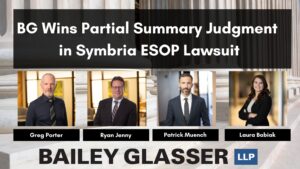
On March 25, 2024, Bailey & Glasser, LLP won a motion for partial summary judgment in the U.S. District Court for the Northern District of Illinois in the case Placht v. Argent Trust Company, Case No. 21-cv-5783. The lawsuit claims that Argent, the trustee for the Symbria Inc. Employee Stock Ownership Plan (the “ESOP”), caused the ESOP to purchase $66,500,000 of Symbria, Inc. stock for more than fair market value, violating federal pension law in the ERISA statute. The court held that the plaintiff proved every element of her ERISA prohibited transaction claims, removing the need to provide additional proof of these elements at trial.
The court made important rulings of law in favor of the plaintiff and beneficiaries of employee benefit plans generally.
First, the court rejected Argent’s argument that the plaintiff’s claim that Argent caused the ESOP to engage in a prohibited transfer of plan assets to “parties in interest” to the ESOP requires a showing of subjective intent to benefit such parties through the transfer. The court explained that rejecting a subjective intent requirement comports with Congress’ intent for the statute to set forth per se violations, for which the parties’ intent should have no bearing as to whether a violation occurred. This has been a hotly contested issue in ERISA litigation.
Second, the court rejected Argent’s argument that an affirmative defense that the ESOP paid “adequate consideration” thwarted the plaintiff’s claims concerning the allegedly prohibited and imprudent stock transaction. Referring to facts adduced by the plaintiff and the plaintiff’s experts’ analyses, the court held that “factual questions exist as to whether Argent acted prudently and ensured that the Plan paid no more than ‘adequate consideration’ for the Symbria stock.” Therefore the plaintiff’s “claims and Argent’s defenses with respect to the ESOP Transaction must proceed to trial.” This decision puts plan fiduciaries to their proof and is precedent that, rather than being decided on a premature summary judgment, trials are required on the fact-intensive inquiry into the diligence of trustees’ stock valuations and transaction negotiations.
For more visit here.
